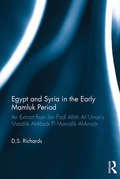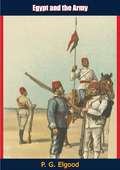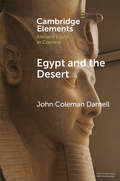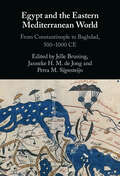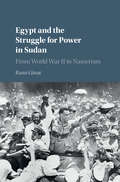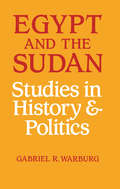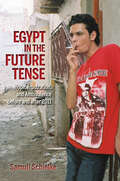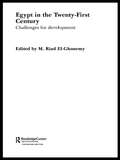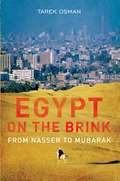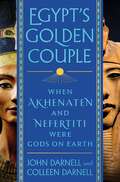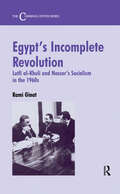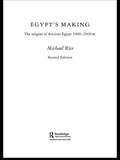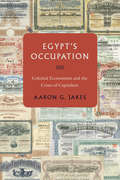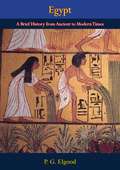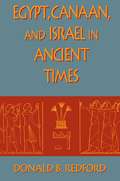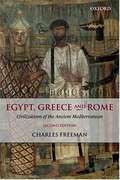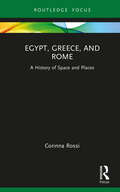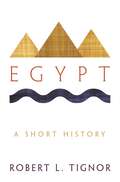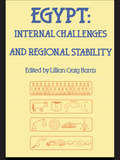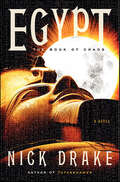- Table View
- List View
Egypt and Syria in the Early Mamluk Period: An Extract from Ibn Faḍl Allāh Al-‘Umarī's Masālik Al-Abṣār Fī Mamālik Al-Amṣār
by D.S. RichardsProviding a modern English translation of a key selection of Ibn Fadl Allah al-`Umarī’s Masālik al-absār, this book offers a rich description of Egypt and Syria under the Mamluks in the first half of the fourteenth-century A.D. It provides a fascinating snapshot of the physical and administrative geography of this crucial region as well as insights into its society and the organization and functioning of the Mamluk state.
Egypt and the Army
by P. G. ElgoodIn his 1924 book, Egypt and the Army, author P. G. Elgood demonstrated his intimate knowledge and reasoned criticism of the conditions and circumstances which brought the Egyptian Army into being from 1882 onwards, and resulted in the creation of a reliable fighting force when trained and disciplined by carefully selected British officers.An invaluable addition to any History library.
Egypt and the Desert (Elements in Ancient Egypt in Context)
by John Coleman DarnellDeserts, the Red Land, bracket the narrow strip of alluvial Black Land that borders the Nile. Networks of desert roads ascended to the high desert from the Nile Valley, providing access to the mineral wealth and Red Sea ports of the Eastern Desert, the oasis depressions and trade networks of the Western Desert. A historical perspective from the Predynastic through the Roman Periods highlights how developments in the Nile Valley altered the Egyptian administration and exploitation of the deserts. For the ancient Egyptians, the deserts were a living landscape, and at numerous points along the desert roads, the ancient Egyptians employed rock art and rock inscriptions to create and mark places. Such sites provide considerable evidence for the origin of writing in northeast Africa, the religious significance of the desert and expressions of personal piety, and the development of the early alphabet.
Egypt and the Eastern Mediterranean World: From Constantinople to Baghdad, 500-1000 CE
by Jelle Bruning Janneke, H. M. de Jong Petra M. SijpesteijnDuring the period 500–1000 CE Egypt was successively part of the Byzantine, Persian and Islamic empires. All kinds of events, developments and processes occurred that would greatly affect its history and that of the eastern Mediterranean in general. This is the first volume to map Egypt's position in the Mediterranean during this period. Drawing on a wide range of disciplines, the individual chapters detail its connections with imperial and scholarly centres, its role in cross-regional trade networks, and its participation in Mediterranean and Near Eastern cultural developments, including their impact on its own literary and material production. With unparalleled detail, the book tracks the mechanisms and structures through which Egypt connected politically, economically and culturally to the world surrounding it.
Egypt and the Limits of Hellenism
by Ian S. MoyerIn a series of studies, Ian Moyer explores the ancient history and modern historiography of relations between Egypt and Greece from the fifth century BCE to the early Roman Empire. Beginning with Herodotus, he analyzes key encounters between Greeks and Egyptian priests, the bearers of Egypt's ancient traditions. Four moments unfold as rich micro-histories of cross-cultural interaction: Herodotus' interviews with priests at Thebes; Manetho's composition of an Egyptian history in Greek; the struggles of Egyptian priests on Delos; and a Greek physician's quest for magic in Egypt. In writing these histories, the author moves beyond Orientalizing representations of the Other and colonial metanarratives of the civilizing process to reveal interactions between Greeks and Egyptians as transactional processes in which the traditions, discourses and pragmatic interests of both sides shaped the outcome. The result is a dialogical history of cultural and intellectual exchanges between the great civilizations of Greece and Egypt.
Egypt and the Struggle for Power in Sudan: From World War II to Nasserism
by Rami GinatFor decades, the doctrine of the 'Unity of the Nile Valley' united Egyptians of a variety of political and nationalist backgrounds. Many Egyptians regarded Sudan as an integral part of their homeland, and therefore battled to rid the entire Nile Valley of British imperialism and unite its inhabitants under the Egyptian crown. Here, Rami Ginat provides a vital and important revised account of the history of Egypt's colonialist struggle and their efforts to prove categorically that the Nile Valley constituted a single territorial unit. These were clustered around several dominant theoretical layers: history, geography, economy, culture and ethnography. This book, for both Middle Eastern and African historians, uses a mixture of Arabic and English sources to critically examine the central stages in the historical development of Egypt's doctrine, concentrating on the defining decade (1943-1953) that first witnessed both the pinnacle of the doctrine's struggle and the subsequent shattering of a consensual nationalist dream.
Egypt and the Sudan: Studies in History and Politics
by Gabriel R WarburgThis title makes an important contribution to our understanding of British rule in the Nile Valley, with special relevance to the important role of the Sudan in Anglo-Egyptian relations until 1956. It examines British policy in Egypt in some detail and compares the relative importance of the Middle East and North Africa in shaping Egypt's regional policy since the advent of Muhammad Ali.
Egypt in Italy
by Molly Swetnam-BurlandThis book examines the appetite for Egyptian and Egyptian-looking artwork in Italy during the century following Rome's annexation of Aegyptus as a province. In the early imperial period, Roman interest in Egyptian culture was widespread, as evidenced by works ranging from the monumental obelisks, brought to the capital over the Mediterranean Sea by the emperors, to locally made emulations of Egyptian artifacts found in private homes and in temples to Egyptian gods. Although the foreign appearance of these artworks was central to their appeal, this book situates them within their social, political, and artistic contexts in Roman Italy. Swetnam-Burland focuses on what these works meant to their owners and their viewers in their new settings, by exploring evidence for the artists who produced them and by examining their relationship to the contemporary literature that informed Roman perceptions of Egyptian history, customs, and myths.
Egypt in the Future Tense: Hope, Frustration, And Ambivalence Before And After 2011 (Public Cultures Of The Middle East And North Africa Ser.)
by Samuli SchielkeAgainst the backdrop of the revolutionary uprisings of 2011-2013, Samuli Schielke asks how ordinary Egyptians confront the great promises and grand schemes of religious commitment, middle class respectability, romantic love, and political ideologies in their daily lives, and how they make sense of the existential anxieties and stalled expectations that inevitably accompany such hopes. Drawing on many years of study in Egypt and the life stories of rural, lower-middle-class men before and after the revolution, Schielke views recent events in ways that are both historically deep and personal. Schielke challenges prevailing views of Muslim piety, showing that religious lives are part of a much more complex lived experience.
Egypt in the Twenty First Century: Challenges for Development (Routledgecurzon Advances In Middle East And Islamic Studies #No.2)
by M. Riad El-GhonemyThe book focuses on three main themes:*overpopulation associated with low productivity, unemployment, persistent poverty and weak savings and investment capacity*the post-1950 development strategies and their outcomes*the institutional structures that are constraining economic and political progress. Egypt in the Twenty First Century is a much need
Egypt on the Brink: From Nasser to Mubarak
by Tarek OsmanFamous until the 1950s for its religious pluralism and extraordinary cultural heritage, Egypt is now seen as an increasingly repressive and divided land, home of the Muslim Brotherhood and an opaque regime headed by the aging President Mubarak. In this immensely readable and thoroughly researched book, Tarek Osman explores what has happened to the biggest Arab nation since President Nasser took control of the country in 1954. He examines Egypt's central role in the development of the two crucial movements of the period, Arab nationalism and radical Islam; the increasingly contentious relationship between Muslims and Christians; and perhaps most important of all, the rift between the cosmopolitan elite and the mass of the undereducated and underemployed population, more than half of whom are aged under thirty. This is an essential guide to one of the Middle East's most important but least understood states.
Egypt's Golden Couple: When Akhenaten and Nefertiti Were Gods on Earth
by John Darnell Colleen DarnellTwo celebrated Egyptologists bring to vivid life the intriguing and controversial reign of King Tut's parents.Akhenaten has been the subject of radically different, even contradictory, biographies. The king has achieved fame as the world's first individual and the first monotheist, but others have seen him as an incestuous tyrant who nearly ruined the kingdom he ruled. The gold funerary mask of his son Tutankhamun and the painted bust of his wife Nefertiti are the most recognizable artifacts from all of ancient Egypt. But who are Akhenaten and Nefertiti? And what can we actually say about rulers who lived more than three thousand years ago?November 2022 marks the centennial of the discovery of the tomb of Tutankhamun and although "King Tut" is a household name, his nine-year rule pales in comparison to the revolutionary reign of his parents. Akhenaten and Nefertiti became gods on earth by transforming Egyptian solar worship, innovating in art and urban design, and merging religion and politics in ways never attempted before. Combining fascinating scholarship, detective suspense, and adventurous thrills, Egypt's Golden Couple is a journey through excavations, museums, hieroglyphic texts, and stunning artifacts. From clue to clue, renowned Egyptologists John and Colleen Darnell reconstruct an otherwise untold story of the magnificent reign of Akhenaten and Nefertiti.
Egypt's Incomplete Revolution: Lutfi al-Khuli and Nasser's Socialism in the 1960s
by Rami GinatThe importance of Lutfi al-Khuli and the intellectual circle associated with the Nasserist regime is examined here. Rami Ginat looks at al-Khuli's contribution to the short-lived yet formidable success of Arab socialism.
Egypt's Making: The Origins of Ancient Egypt 5000-2000 BC
by Michael RiceAlready a classic and widely used text, this second edition has been wholly revised and updated in the light of the many discoveries made since its first publication. Michael Rice's bold and original work evokes the fascination and wonder of the most ancient period of Egypt's history. Covering a huge range of topics, including formative influences in the political and social organization and art of Egypt, the origins of kingship, the age of pyramids, the nature of Egypt's contact with the lands around the Arabian Gulf, and the earliest identifiable developments of the historic Egyptian personality. Egypt's Making is a scholarly yet readable and imaginative approach to this compelling ancient civilization.
Egypt's Occupation: Colonial Economism and the Crises of Capitalism
by Aaron G. JakesThe history of capitalism in Egypt has long been synonymous with cotton cultivation and dependent development. From this perspective, the British occupation of 1882 merely sealed the country's fate as a vast plantation for European textile mills. All but obscured in such accounts, however, is Egypt's emergence as a colonial laboratory for financial investment and experimentation. Egypt's Occupation tells for the first time the story of that financial expansion and the devastating crises that followed. Aaron Jakes offers a sweeping reinterpretation of both the historical geography of capitalism in Egypt and the role of political-economic thought in the struggles that raged over the occupation. He traces the complex ramifications and the contested legacy of colonial economism, the animating theory of British imperial rule that held Egyptians to be capable of only a recognition of their own bare economic interests. Even as British officials claimed that "economic development" and the multiplication of new financial institutions would be crucial to the political legitimacy of the occupation, Egypt's early nationalists elaborated their own critical accounts of boom and bust. As Jakes shows, these Egyptian thinkers offered a set of sophisticated and troubling meditations on the deeper contradictions of capitalism and the very meaning of freedom in a capitalist world.
Egypt, A Brief History from Ancient to Modern Times
by P. G. ElgoodThis new edition of Egypt: A Brief History from Ancient to Modern Times, first published in 1949, was one of several invaluable and informative books on Egyptian history, written by the British Army Lieut.-Col. P. G. Elgood, who was stationed in Egypt during World War I.This new edition contains two supplemental chapters that bring the story of Egypt from 1935, where Lt.-Col. Elgood left it, to the Allied victory of Alamein, November 1942. They were contributed by a close friend of Elwood, who was a competent student of Egyptian affairs.“THE history of Pharaonic Egypt is confused, the chronology uncertain. Despite generations of research, there are gaps still unbridged, inconsistencies still awaiting explanation. Dynasties rise and fall, doctrines blossom and decay: empire fades, ambitions wither. Such in the main is the story which records and monuments covering a period of three thousand years tell. Yet its study is worth the pains, for ancient Egypt, has profoundly influenced the culture of the world.”—Chapter 1
Egypt, Canaan, and Israel in Ancient Times
by Donald B. RedfordCovering the time span from the Paleolithic period to the destruction of Jerusalem in 586 B.C., the eminent Egyptologist Donald Redford explores three thousand years of uninterrupted contact between Egypt and Western Asia across the Sinai land-bridge. In the vivid and lucid style that we expect from the author of the popular Akhenaten, Redford presents a sweeping narrative of the love-hate relationship between the peoples of ancient Israel/Palestine and Egypt.
Egypt, Greece and Rome Civilizations of the Ancient Mediterranean (2nd Edition)
by Charles FreemanEgypt, Greece and Rome is regarded as one of the best general histories of the ancient world. It is written for the general reader and the student coming to the subject for the first time and provides a reliable and highly accessible point of entry to the period. The volume begins with the early civilizations of Sumer (modern Iraq) and continues through to the Islamic invasions and the birth of modern Europe after the collapse of the western Roman empire. The book ranges beyond political history to cover philosophy, art and literature. A wide range of maps, illustrations and photographs complements the text. The second edition incorporates new chapters on the ancient Mediterranean and the Ancient Near East, as well as extended coverage of Egypt.
Egypt, Greece, and Rome: A History of Space and Places (Routledge Focus on Classical Studies)
by Corinna RossiHistorical events literally took place in specific contexts; 'where things are' shapes 'how things are'. In this book, Corinna Rossi examines how three different ways of interacting with the surrounding world were shaped by their physical context in ancient Egypt, Greece, and Rome. Following a discussion on the relationship between history and geography, Rossi delves into the geographical settings of these three civilisations, analysing human mobility within them and how cultural development was shaped by these movements. Rossi also identifies three possible models to describe the three different approaches specific to each of these ancient societies. Egypt, Greece, and Rome: A History of Space and Places is suitable for students and scholars with previous understanding of these three civilisations and an interest in the relationship between history and geography.
Egypt: A Fragile Power (The Contemporary Middle East)
by Eberhard KienleFocusing on authoritarian rule, unresolved economic challenges, and external dependency, the volume explains the salient political and economic features of contemporary Egypt against the backdrop of its history since the beginning of the 19th century. Presenting a comprehensive account of developments, it challenges common assumptions about secularists, Islamists, and revolutionaries, as well as 'modernization', 'economic reform', and political stability. Discussing domestic politics, economic change, and external relations since 1945, the author argues that Egypt continued to draw a degree of strength from sustained state-building activities, which its pre-colonial rulers could pursue in a favourable international environment and the partly related emergence of the country as a focal point of collective identity. More consolidated than many other states in the global south, Arab and non-Arab alike, independent Egypt, despite changing economic strategies, remained a (lower) middle-income country and despite repeated political contestation, most recently in the Arab Spring, continued to suffer from autocratic rule. Such continuity reflects not only the interplay between political forces at home, dominated by the military, and inconclusive economic policies but also the external constraints under which governments and other actors in the global south have to act. Based on numerous primary and secondary sources in various languages, including Arabic, and years of fieldwork, the book is a key resource for scholars of all levels, journalists, policymakers, and diplomats interested in comparative politics and the political economy of the Middle East and Egypt.
Egypt: A Short History
by Robert L. TignorA sweeping and colorful account of Egypt’s 5000-year historyThis is a sweeping, colorful, and concise narrative history of Egypt from the beginning of human settlement in the Nile River valley 5000 years ago to the present day. Accessible, authoritative, and richly illustrated, this is an ideal introduction and guide to Egypt's long, brilliant, and complex history for general readers, tourists, and anyone else who wants a better understanding of this vibrant and fascinating country, one that has played a central role in world history for millennia—and that continues to do so today.Respected historian Robert Tignor, who has lived in Egypt at different times over the course of five decades, covers all the major eras of the country's ancient, modern, and recent history. A cradle of civilization, ancient Egypt developed a unique and influential culture that featured a centralized monarchy, sophisticated art and technology, and monumental architecture in the form of pyramids and temples. But the great age of the pharaohs is just the beginning of the story and Egypt: A Short History also gives a rich account of the tumultuous history that followed—from Greek and Roman conquests, the rise of Christianity, Arab-Muslim triumph, and Egypt's incorporation into powerful Islamic empires to Napoleon's 1798 invasion, the country's absorption into the British Empire, and modern, postcolonial Egypt under Nasser, Sadat, and Mubarak.This book provides an indispensable key to Egypt in all its layers—ancient and modern, Greek and Roman, and Christian and Islamic. In a new afterword the author analyzes the recent unrest in Egypt and weighs in on what the country might look like after Mubarak.
Egypt: Internal Challenges and Regional Stability
by Lillian C HarrisKassem provides a concise and accessible introduction to Egypt, including chapters on domestic politics, foreign policy, economy and state formation. It will be of interest to anyone studying Egypt from a social science perspective.
Egypt: Mass Arrests and Torture in Sinai
by Human Rights WatchOn October 7, 2004, a massive car-bomb wrecked the Taba Hilton hotel located on the Egyptian-Israeli border. There were two smaller bombings later that night at nearby tourist campsites. The attacks killed more than thirty and wounded more than one hundred. Most of the victims were tourists, many of them Israelis, as well as Egyptian hotel staff. Initial speculation by Egyptian and Israeli authorities focused on al-Qaeda or other international groups that have carried out large-scale attacks against civilians. But just over two weeks later, on October 25, Egypt's Ministry of Interior announced that it had identified nine persons responsible for the attacks, all from the North Sinai area: five were in custody, two had been killed carrying out the attack, and two remained at large. Meanwhile, around October 13, Egypt's State Security Investigation service (SSI) began a campaign of mass arbitrary arrests in and around al-`Arish, the government and commercial center of North Sinai, apparently as part of its investigation into the Taba attacks. These arrests continued unabated after the October 25 announcement through early December. Egyptian human rights groups said that security forces had rounded up as many as three thousand persons, including several hundred persons detained solely to secure the surrender of wanted family members.
Egypt: Security Forces Abuse of Anti-War Demonstrators
by Human Rights WatchThis report documents serious human rights violations by Egyptian security officials during and following large demonstrations in Cairo on March 20 and 21, 2003 against the U.S.-led war in Iraq. These violations included: excessive use of force in disbursing demonstrators and bystanders on March 21 in violation of the right to freedom of assembly; arbitrary arrest and detention, including of children; beatings and mistreatment of persons in detention, in some cases amounting to torture; and failure to provide medical care to seriously injured detainees.
Egypt: The Book of Chaos (Rahotep Series #3)
by Nick DrakeThe future ofEgypt lies in the hands of the Medjay’s chiefdetective Rahotep in the final, gripping installmentof Nick Drake’s acclaimed Ancient Egyptian trilogy. Following Nefertitiand Tutankhamun, Egypt: The Book of Chaos putsRahotep on a high-stakes adventure across enemyempires and rogue states on a top-secret mission to secure the fate of thedynasty. Readers of Stacy Schiff’s Cleopatraand anyone fascinated by ancient cultures and unspoken secrets will beinstantly drawn in by Drake’s magisterial recreation of one of history’s greatunsolved mysteries. Incorporating his own research through the sites,monuments, ruins, and museums of Egypt, Drake brings vividly back to life anera long ago swallowed by the shifting sands of time in this powerful novel ofloyalty, ambition, struggle, and destiny.
